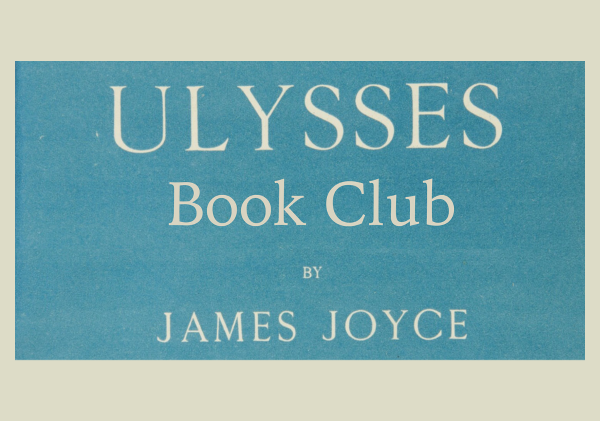Ulysses Book Club: A Reading and Discussion

This year marked the 100th centennial of the publication of James Joyce’s Ulysses. Professors Louise Hornby and Colleen Jaurretche celebrated the occasion with the Ulysses Book Club, which brought together faculty, students and alumni in six sessions to read and discuss the novel. We caught up with Professors Hornby and Jaurretche to talk about the club.
How did the book club come about?
LH: Colleen Jaurretche was the instigator of the project, when she suggested that the English department do something to acknowledge the 100th year anniversary of the publication of Ulysses. After a series of conversations, we decided that the best way to celebrate the book was to read it and to do so collectively and informally.
CJ: The book club came about because there was will and energy to celebrate the 100th anniversary of Ulysses. The novel blossoms in communal reading, and so the idea of a book club was irresistible!
Why read Ulysses?
LH: Because it is there to be read, like any other book, really. I don’t think of it as a didactic book—the scenes of teaching in the novel are disastrous—but it is about knowledge and challenging the limits of understanding.
CJ: Read Ulysses because it’s beautiful, profound, funny, and forgiving of our human faults and flaws. Read Ulysses because it will challenge every notion you have about what a novel is and will push you to learn new things. Read Ulysses because it will bring new people and experiences into your life—I promise!
How many times have you read Ulysses? What makes you want to keep re-reading it?
LH: I don’t know how many times I have read it. Enough times that pages have fallen out of my copy from college and subsequently from its replacement. I am reluctant to buy another one, though. I am attached to my old editions and with their scribbled layers of annotations.
CJ: I have lost count of how many times I’ve read Ulysses! My readings of it began in a seminar while an undergraduate here in the English department. The following year I took on the challenge of writing an honors thesis, so in total my undergraduate years probably occasioned four or five readings. In graduate school (also here in the department) I must have read it a few times more for my dissertation and first book. I have been fortunate to have numerous occasions to teach the novel, each of which involves at least partial rereading of the book. All in all, I will estimate about 15-20 readings of the novel, and counting.
Did you learn anything new from this recent re-reading?
LH: This was a pandemic reading group—we met over zoom each time—so it had that strange, fragmented feeling that zoom conversations tend to have. While it is a novel that is really funny in parts, this reading felt more melancholic, more freighted by the solipsistic grief with which the novel begins. I’m teaching it again this quarter and being in the classroom again has brought back some of the novel’s exuberance.
CJ: From this recent re-reading with the English department, I learned that the book remains beguiling, timeless, and authentic.
What advice did you give the group for tackling this novel?
LH: I think we just told them just to read it and to keep going even if they didn’t understand.
CJ: My advice to groups reading Ulysses is always to cut yourself some slack: don’t devote yourself to looking up every arcane reference. And by all means avail of good resources for plot overview and the like. In other words, don’t suffer!
If you could describe Ulysses in one sentence to someone who hasn’t read it, what would you say?
LH: I would say that it is the precursor to Finnegans Wake. Or I might say it is about getting through a very long day.
CJ: Ulysses is not only a day in the life of three folks in 1904 Dublin, but also a window to the global twentieth-century, and our interconnections with one another.
Lastly, if you could ask Joyce one question about Ulysses, or about himself, what would you ask?
LH: I really don’t know!
CJ: The question I would want to ask Joyce is what he meant when he said that after writing Finnegans Wake he would write “a simple book about the sea.” I have always wondered what he had in mind, and wish he’d lived to realize that vision.